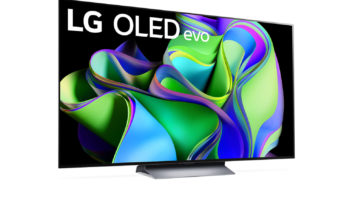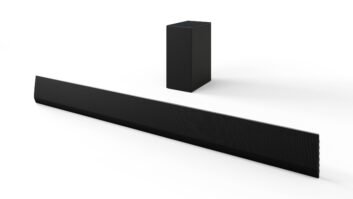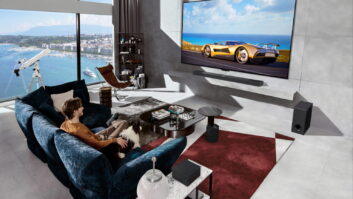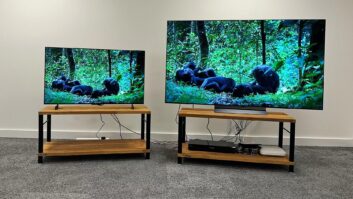
Editor’s Note: This article originally appeared on our sister site, TechRadar.
LG has announced that its new 2023 TVs will offer native support for DTS audio codecs for the first time, including the Dolby Atmos rival DTS:X.
Xperi, the company behind DTS:X, revealed in a press release that LG’s latest OLED and premium LCD TVs would incorporate its audio codec. Later, LG Korea reportedly confirmed to FlatPanelsHD that all of its 2023 OLED TVs (including the LG C3 and LG G3) and the “QNED85 and up” will be able to decode the DTS, DTS:X, and IMAX Enhanced audio codecs. However, LG added that its TV speakers won’t be able to play back DTS:X enhanced audio, instead, they’ll just be able to send the data to an external sound system that can.
Xperi’s DTS and DTS:X codecs are used by many Blu-ray discs and the IMAX-enhanced Marvel films on Disney Plus, so by supporting this codec LG’s 2023 OLED TVs just got a nice upgrade to their audio over their predecessors (and many rivals) if you have a library of discs (as many hardcore home theater fans do). Sure, you need one of the best soundbars or an AV receiver to actually hear the difference, but this limitation is not unexpected – the vast majority of TVs don’t boast speaker setups that can properly use immersive audio codecs like DTS:X and Dolby Atmos.
What is DTS:X?
DTS:X shares a lot of similarities with an alternative audio codec: Dolby Atmos. Just like Atmos, DTS:X aims to create a realistic, multi-dimensional soundstage where sound moves around you to make what you’re watching feel more real. For example, if a helicopter flies overhead in the film you’re watching, DTS:X and the right speaker system should make it sound as if it is really flying over your head.
Like Dolby Atmos, it’s object-based in 3D space, rather than channel-based. Which means you don’t need to have a specific kind of setup for it to work – it should be able to take advantage of soundbars with three speaker channels, or with 15.
But there are a few differences, such as the fact that DTS:X supports higher bitrates – read: on paper, it has better audio quality – though Dolby claims Atmos is more efficient with its bitrate use, resulting in comparable sound quality from both.

But the main thing is that not all content will support both DTS:X and Dolby Atmos. Many Blu-rays and 4K Blu-rays will favor DTS:X, while many of the best streaming services like Netflix and Amazon Prime Video only use Dolby Atmos. Disney Plus is one of the fewer streamers bucking the trend by announcing that IMAX Enhanced versions of its Marvel films will use DTS sound.
With LG’s 2023 TVs boasting DTS:X support and maintaining support for Dolby Atmos, these screens will offer users the versatility to enjoy content from a variety of sources – be it streamed or from a disc – at the highest possible quality.
Just remember that a TV saying that it supports DTS:X and Dolby Atmos doesn’t mean that its in-built speakers will necessarily be capable of outputting sound using these codecs. As is the case with LG screens, it simply has the ability to transfer Dolby Atmos and DTS:X data to a sound system or soundbar that can actually put them to use – our guide to the best Dolby Atmos soundbars is a great place to start, as long as you check for those that have DTS support too. (LG, Samsung, and Sony usually include this; Sonos not so much.)
About the Author
Hamish Hector is a Staff Writer for TechRadar and you’ll see his name appearing on articles across nearly every topic on the site from smart home deals to speaker reviews to graphics card news and everything in between. He uses his broad range of knowledge to help explain the latest gadgets and if they’re a must-buy or a fad fueled by hype. Though his specialty is writing about everything going on in the world of virtual reality and augmented reality.
See also: Philips Hue Sync TV App Provides Immersive Lighting To Compliment Your TV













